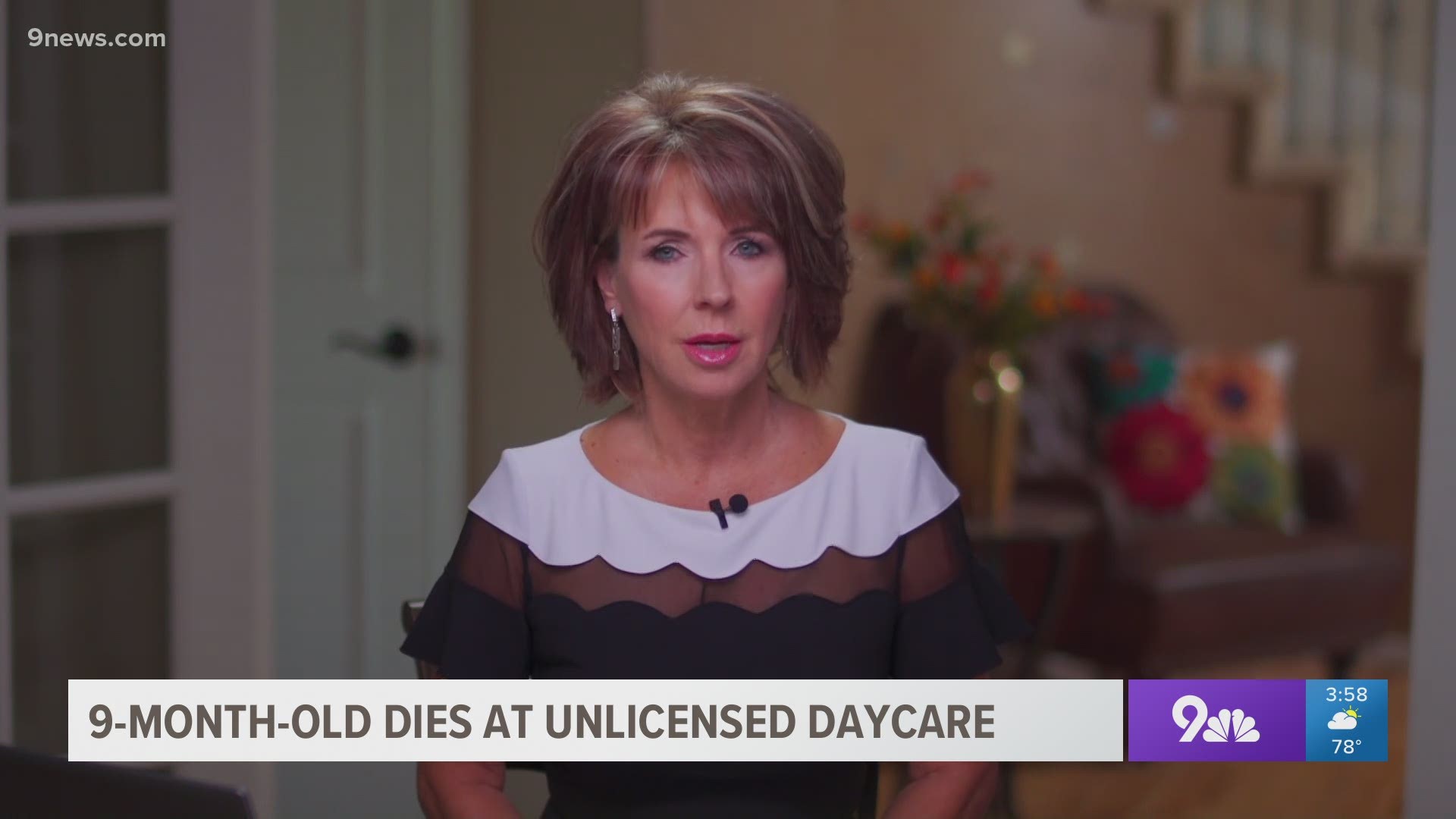PARKER, Colo. — Multiple agencies are investigating the death of an infant following an incident at an unlicensed in-home daycare late last month where at least 16 children, most of them toddlers, were being looked after.
The Douglas County Sheriff's Office (DCSO) said Tuesday there is an open death investigation related to the incident, which occurred at 14166 Lexington Dr. in Parker on Aug. 26.
The coroner's office said that just after 3 p.m. on that date, they were notified of the infant's death by the emergency department at Sky Ridge Medical Medical Center.
While the child has been identified, the coroner's office is not releasing the name at this time. An autopsy was completed, but the coroner did not indicate how the child died and said the report would be available once the investigation is complete.
In the immediate hours following the incident, Amanda Anderson refused to let police into the home, according to a complaint from the Colorado Dept. of Human Services (CDHS).
Eventually, police got a warrant and reported that at the time of the incident, there were 16 children at the home, most of them toddlers, the complaint says.
A spokesperson for CDHS said prior to the Aug. 26 incident, they were unaware care was being provided at the home and said a cease and desist order was served to Anderson on Aug. 27, and that it was related to the incident which occurred the day before.
On Aug. 27, officers and caseworkers with CDHS went to Anderson's home to serve that cease and desist order.
RELATED: State expects reports of educational neglect to rise as educators adjust to remote learning
Anderson stated "she is not caring for kids anymore," according to the complaint, and asked the workers to come in and look. The workers declined to enter, the complaint says. Workers said they told Anderson about the cease and desist order, but said Anderson refused to sign anything and instead told workers to provide the paperwork to her attorney.
Documents from CDHS show Anderson had other complaints filed against her for potential unlicensed childcare dating back to 2014.
In March 2014, someone reported to CDHS that Anderson was providing unlicensed care, the complaint says.
A worker went to the home and observed one child. According to the complaint, Anderson stated she only watched one unrelated child. When contacted again by CDHS in August 2016, Anderson said she "occasionally" provided care for one neighbor's child and was not providing regular child care, according to the complaint.
CDHS workers determined accusations of illegal childcare in 2016 were "unfounded," the complaint says.
The agency received a complaint about unlicensed care occurring at the same home on July 19, 2018. Several days later, on July 26, caseworkers conducted a site visit.
There was a car in the driveway, but no one answered, according to the complaint. A business card was left on the door, the letter says.
The complaint also notes that "this provider has been contacted twice previously with a cease and desist letter" which was served at another address in the same neighborhood.
On one of those occasions, surveillance was conducted and it was confirmed Anderson was "doing unlicensed child care," according to the 2018 complaint.
On July 27, 2018, Anderson sent an email to the caseworker who had left a business card on her door asking about why the card was left. Through email, the worker made Anderson aware that an unlicensed child care complaint was received and a cease and desist letter was emailed, the complaint says.
Two days later, on July 29, 2018, the cease and desist letter was signed and emailed to the licensing specialist, the complaint says.
Anderson said at the time, she was "currently operating within exemption guidelines" and "will be applying for a child care license," according to the complaint.
Prior to the infant's death late last month, Anderson was last contacted in January of this year regarding a complaint that she was operating without a license and caring for between seven and 10 children.
Anderson told workers she was watching four children and "was aware of the rules and laws" and knew "when she needs to be licensed," the complaint says.
She also told the worker, according to the complaint, that her ex-husband was "causing her lots of problems" and "calling CPS on her," the complaint says.
A CDHS spokesperson said that a licensing specialist determined at the time that Anderson was providing "legally exempt care."
CDHS said the initial cease and desist order is served as an informational warning letter, giving the person notice of the law. If the care provided meets a statutory exemption, then licensing has no further involvement. If they are illegally caring for more children than allowed by an exemption, licensing will work with them to become licensed, or informs them that they need to comply with law and care for no more children then allowed by the exemption.
If licensing serves a cease and desist order and then determines that illegal child care continues to occur, licensing staff will conduct surveillance to establish a pattern of care, CDHA said. Once licensing observes a pattern of care, they work with the Attorney General's Office to open up an adverse licensing case that may include an injunction or a fine.
A CDHS spokesperson said the AG's office was not contacted in this case because "no pattern of illegal child care was established."
Homes were less than 24-hour care is provided for four or fewer children between birth and 18 and no more than two of the children are under the age of two years old aren't required to be licensed through the state.
If the caregiver is providing care for their own children, they are included in the four children limit, according to CDHS.
SUGGESTED VIDEOS: Local stories from 9NEWS

